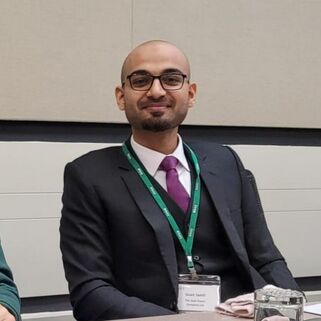
He who has a why to live for can bear almost any how.
Brief Introduction[edit | edit source]
Experienced Mechanical Engineer with a demonstrated history of working in the Energy, Automotive and Petrochemical industry, now doing PhD at University of Western Ontario under the supervision of Dr. Joshua Pearce at Free Appropriate Sustainability Technology (FAST) Lab. Skilled in maintenance of rotating and static equipment along with its monitoring, analysis, diagnosis, and repair as well as troubleshooting. Well-versed with maintenance practices on steam turbines, boilers, multi-stage pumps, compressors, fans. Accomplished/leading Outages and several Projects at Hub Power Station including successful completion of 323 MW Turbine Retrofit with GE, feasibility study of conversion of RFO-fired boilers to coal, storage tanks inspection and repairs etc., while having previously completed Project VIGO/Fortuner (2016-17) at Toyota Indus Motor Company Ltd.. An Engineering Professional with a Bachelor of Engineering (B.E.) in Mechanical and Master of Engineering (M.E.) in Energy Systems from NED University of Engineering and Technology. Moreover, a Certified Energy Manager & Auditor from National Energy Efficiency & Conservation Authority (NEECA).
Education & Academic Research[edit | edit source]
Comprehending the implications of mechanical design on sustainability during high school compelled me to explore more of what I loved. Due to my excellent academic record, I joined one of the best of engineering universities of Pakistan. I graduated from Mechanical Engineering Department with a cumulative grade point average (CGPA) of 3.77 and was ranked among the top 15 students of my batch.
During my undergraduate studies, I worked on various research projects. One such project was “Performance Evaluation and Design Improvement of Tubular used in Petroleum Well”. The main focus of the Project was to conduct a research indicating practical application of Solid Expandable Tubular and Swellable Elastomer technology while designing the petroleum well, rather than only utilizing it as a remediation technique. For the study, I simulated the down-hole conditions via expansion of the tubular considering various constraints using ABAQUS software and obtained the required parameters including length reduction, thickness reduction, required force to pull the mandrel, pressure distribution etc. By incorporating the methodology, the depth of petroleum wells could be increased while it could also prove to be a step forward in the direction of mono diameter well technology.
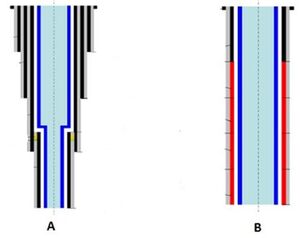
My passion to study and research urged me to continue my graduate studies along with my professional engagements and I completed Master of Engineering in Energy Systems in 2021. My cumulative grade point average (CGPA) for graduate studies is 3.90. During my Masters, I worked on a research project entitled “Evaluation of Significant Contributors in Deformation of High Temperature and Pressure Pipes using Time Dependent Multi-Axial Stress Analysis” with the primary objective to determine actual reason for deformation in high energy piping and subsequently provide recommendations to prevent catastrophic failure and reinstate the piping in its original condition. For the study, I carried out stress analysis using AUTOPIPE software.
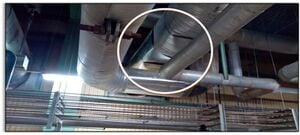
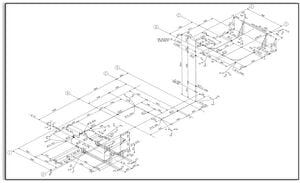
Another interesting project I undertook was "Solar Water Heating for Textile Industries in Pakistan" in which I designed and evaluated parabolic trough and fresnel solar thermal collectors. As a case study for the purpose of this project, a textile industry situated in Karachi was chosen for which saturated steam with a flow rate of 22 tons per hour at 8 bars pressure was required. From the thesis, it was concluded that parabolic trough collectors are more efficient than fresnel collectors.
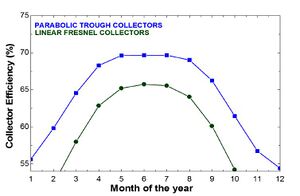
Professional Life & Research Endeavors[edit | edit source]
During my professional life, I have worked on various renewable, non-renewable energy related projects at HUBCO which has an installed capacity of 3000 MW with several projects in the pipeline. Although, I worked on the most efficient thermal power plant in the country, I soon discovered various opportunities for improvement. I worked on and implemented many such ideas including Gas Air Heater (Ljungstrom Bi-Sector Air Preheater) leakage reduction as well as Boiler de-superheating sprays optimization. In one of my researches, I carried out combustion process modelling and optimization to address incomplete combustion and improper heat transfer in oil-fired Boilers. I performed stoichiometric calculations in consultation with Boiler Design Team, determined properties and composition of fuel and carried out flame shape modelling using tertiary air adjustment. I also evaluated creep life of high energy piping implementing theoretical knowledge of Larson Miller Parameter and evaluating actual stress on pipeline. To complement the results of my research, we also performed non-destructive examination of high risk regions using Metallographic Replica and Time of Flight Diffraction (TOFD).
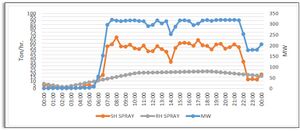
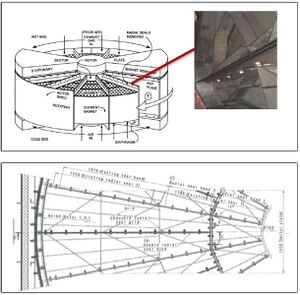
Considering my skills in research, I was provided with the opportunity to lead several projects including a feasibility study related to waste to energy (WTE) project with the main objective to improve waste management system of Karachi, Pakistan, decrease the dependency on fossil fuels for electricity generation and eliminate the health and environmental hazards imposed by municipality solid waste. The project would tackle municipality solid waste disposal as well as address water deficiency issue in Karachi, the 5th largest city of the world. Currently, I am leading a project on alternate energy source for rankine cycle power plants with the primary objective of alleviating the power shortage, optimizing the power structure while simultaneously promoting the economic development and social stability of Pakistan with optimized cost of electricity. Moreover, I have also carried out energy and efficiency audits as an Energy Auditor as well.
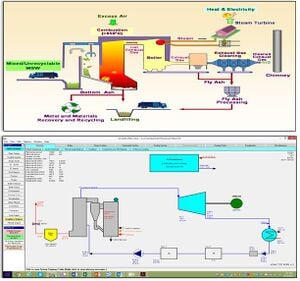
Affiliations[edit | edit source]
I have been an active member of Institution of Mechanical Engineers (IMechE), Pakistan and served as a Treasurer of IMechE Pakistan – South Chapter. Moreover, I was one of the founding members of IMechE Pakistan Power Centre established to coordinate academic and literary activities in Pakistan with regards to Power and Energy Sector. The affiliation provided me with platforms that have been vital in the development of my leadership and critical thinking skills, in addition to the global exposure that I acquired by organizing and participating in various events on an international scale.
I am one of the founding members and directors of Agrivoltaics Canada - a not-for-profit corporation.
Current Research Work[edit | edit source]
The current line of research I am putting my endeavors to is a case for Green, Sustainable, Clean & Renewable Energy Generation – Agrivoltaics in Canada: Addressing Potential Opportunities and Barriers to Practical Adoption of Technology.
Canada has shown a growing economic trajectory over the last three decades. Such growth comes at an expense of increased energy use. To suffice the need, it is imperative to look into inexhaustible and alternate energy supply options. Agrivoltaic systems are a strategic and innovative approach that intertwines solar photovoltaic (PV)-based renewable energy generation with agricultural production. To translate the potentials offered by the technology, the research proposes a dive into the technological, economic and communal opportunities and barriers which will prove to be fruitful in the diffusion of technology for pragmatic purposes. Agrivoltaics which involves parallel utilization of both solar photovoltaic (PV)-based energy generation and agriculture, can address the ever-increasing requirements of energy as well as food while reducing conventional/fossil fuel consumption and greenhouse gas emissions. The proposal is unique as it provides a holistic and an all-encompassing approach to integrate the innovation into Canada's landscape in particular and the world in general. The study will also provide a ground work for policy co-ordination in the renewable energy sector, which has an enormous regional potential. The research further aims to draw recommendations and suggestions to translate this potential into addressing the energy needs of the country through empirical and model-based approach.
Literature Review
- Dual use of land for PV farms and agriculture literature review
- Agrivotlaics
- Additional Service provided by Solar PV Systems: A review
- Literature Review Lettuce Agrivoltaics
Western Innovation for Renewable Energy Deployment (WIRED)
I am currently leading the development of a 110kW Agrivotlaics test site - WIRED (Western Innovation for Renewable Energy Deployment) - at the The Institute for Chemicals and Fuels from Alternative Resources. It will be the first Agrivoltaics test site inside Canada which will be used to experiment different PV racking designs with different types of crops. For more information, please visit Western Innovation for Renewable Energy (WIRED) page.
Agrivoltaics Conference - 2022
I was a panelist for "Agrivoltaic Research Panel - Environmental, Enhanced Crop Performance, Latest Yields, Types, Locations, WIRED" at the first ever Agrivoltaics Conference in Canada where I discussed the impacts of Agrivotlaics on crop yield. Moreover, I also spoke on the current policies inside Canada and future legislative measures that need to be adopted for swift dissemination of the technology on the "Agrivoltaics and Energy Policy Changes" panel at the conference.
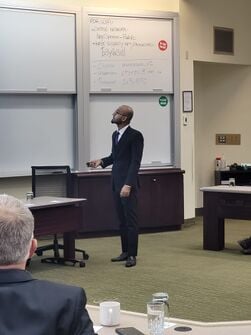
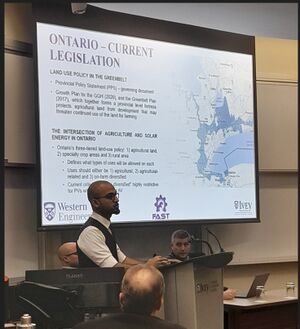
Agrivoltaics Conference - 2023
Extremely proud to have organized and participated as a speaker as well as a moderator for the 2nd Agrivoltaics Conference at Western University. Hosted by Ivey Business School at Western University, the conference united esteemed representatives from notable institutions, fostering meaningful dialogues aimed at promoting a more environmentally sustainable future.
Commencing the event, my introductory presentation delved into the fundamentals of agrivoltaics, examining its various types, implementation strategies, recent research breakthroughs, and notable progress made over the past year. The conference showcased innovative studies illustrating the potential for enhanced energy yield, increased crop productivity, and overall positive environmental impact. Steering a panel discussion on the technological landscape of agrivoltaics brought together brilliant minds in the field. We explored practical applications, challenges, and the evolving technology that is shaping the future of agrivoltaics. The conversation underscored the significance of collaboration among researchers, industry leaders, and farmers to drive meaningful advancements.
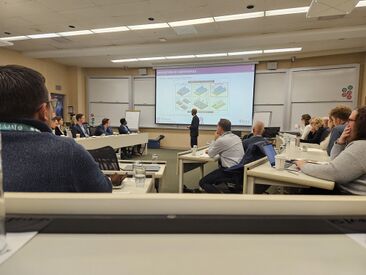
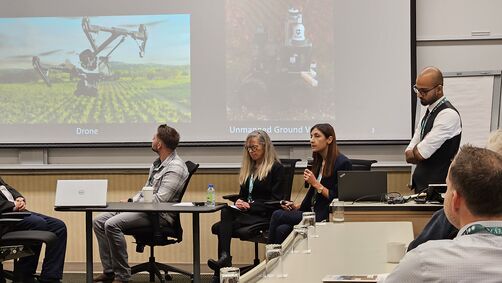
Publications[edit | edit source]
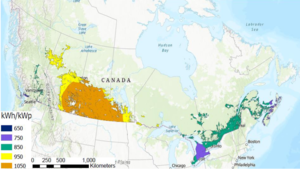

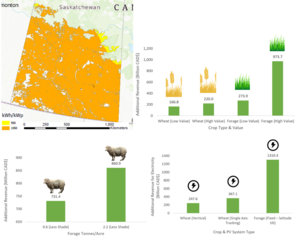
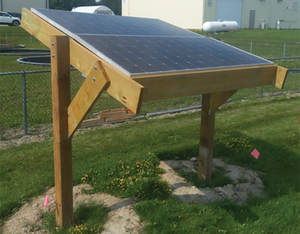
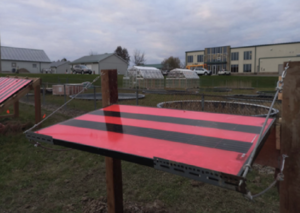
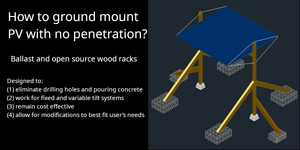
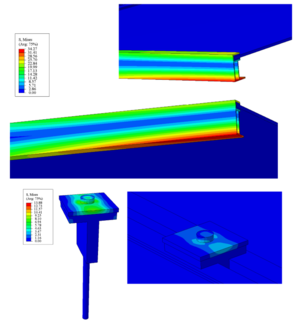

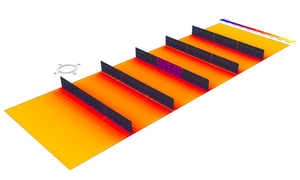
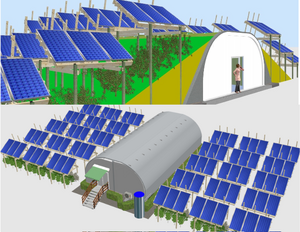
News/Media[edit | edit source]
- https://www.salon.com/2023/05/03/how-shading-crops-with-solar-panels-can-improve-farming-lower-costs-and-reduce-emissions_partner/
- https://www.renewableenergyworld.com/solar/canadas-agrivoltaics-opportunity/#gref
- https://www.cbc.ca/news/canada/london/solar-panel-crops-agri-voltaics-canada-1.6832870
- https://www.bbc.com/future/article/20230424-how-agrivoltaics-helped-save-italys-citron-and-lemon-trees
- https://www.theweathernetwork.com/en/news/climate/solutions/how-agrivoltaics-on-farmland-could-meet-one-third-of-canadas-energy-needs
- https://ca.news.yahoo.com/just-1-farmland-could-meet-130052072.html
- https://www.msn.com/en-ca/money/topstories/how-shading-crops-with-solar-panels-can-improve-farming-lower-food-costs-and-reduce-emissions/ar-AA1aoiCg
- https://www.producer.com/news/research-shows-crops-not-only-grow-but-thrive-amid-solar-panel-installations/
- https://london.ctvnews.ca/western-hosts-inaugural-cleantech-conference-1.6656366
- https://calgary.tech/2023/09/11/agri-solar-tech-solve-alberta-energy/
- https://www.ivey.uwo.ca/energycentre/news/2023/12/agrivoltaics-conference/
- https://www.tvo.org/article/why-solar-power-and-farmers-fields-could-be-the-perfect-combination
- https://www.pv-magazine.com/2024/05/16/3d-printed-clamps-for-front-surface-pv-mounting-on-wood-racking/
- https://www-cbc-ca.cdn.ampproject.org/c/s/www.cbc.ca/amp/1.7206470
- https://3dprinting.com/news/researchers-3d-printed-clamps-for-pv-mounting-on-wood-racking/
- https://www.pv-magazine.com/2024/06/26/what-crops-fit-with-vertical-agrivoltaics/
- https://www.nationalobserver.com/2024/09/04/news/ontario-ban-solar-installations-prime-farmland-agrivoltaics